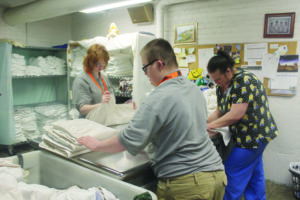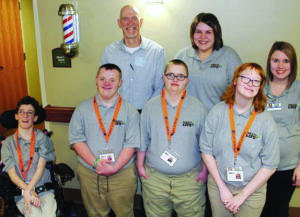Creating an Inclusive Workplace
Editor’s Note: Project Life, an integrated community employment program for people with developmental disabilities, has been postponed for the safety of participants, residents and staff at Fairhaven Community, due to the COVID-19 healthcare crisis. We hope the partnership will continue, stronger than ever, when we can safely implement it again.
Creating an inclusive workplace takes more than one plan or policy, and it’s not something that can ever be checked off a task list. United Church Homes communities welcome people of all abilities to contribute their gifts to the organization’s mission.
According to the U.S. Department of Labor, in an integrated employment setting, employees with disabilities work alongside people who do not have disabilities, and the former earn at least minimum wage paid by the employer. After hire, these employees may have support from a skills coach, but the goal is to transition them to independent employment.

Inclusive Hiring Practices Are Good for Business
It’s not only about integrity, one of United Church Homes’ core values. Over 90 percent of Americans view companies that hire people with disabilities more favorably than those that don’t, and 87 percent would prefer to give their business to companies that hire people with disabilities, according to the Ohio Department of Developmental Disabilities’ Employment First program.
In fact, workplaces can reduce turnover costs by hiring people with disabilities. Research shows people with disabilities tend to keep their jobs longer and have the same or better absentee and sick rates as nondisabled employees. Industry reports consistently rate workers with disabilities as average or above average in performance, quality and quantity of work, flexibility to demands, attendance and safety, the ODDD says.
Like older adults, people with disabilities have historically been excluded from the public eye. Over decades, people with disabilities have demanded and created change, and the treatment and perceptions of disability have evolved.
After groundbreaking regulations passed as part of the U.S. Rehabilitation Act of 1973, disability rights advocate Kitty Cone said it was the first time “disability really was looked at as an issue of civil rights rather than an issue of charity and rehabilitation at best, pity at worst.”
Later, the Americans with Disabilities Act of 1990 prohibited discrimination against people with disabilities in many aspects of public life. Today, organizations must take the next step by welcoming people with disabilities into their ranks.
Expanding Abundant Life to Our Neighbors through Integrated Community Employment
In Upper Sandusky, Ohio, Fairhaven Community took part in Wyandot County’s pilot for Project Life. Developed at Butler Tech in Butler County, Ohio, a career technical educational institute for adults and teens, this multi-year work transition program is designed for young adults with intellectual and developmental disabilities. Project Life is an unpaid internship so young adults can have learning experiences in community employment. Companies and disability advocates have successfully replicated Project Life in Ohio, Kansas, New York and California.

Fairhaven welcomed Project Life interns, ages 19-20, into its laundry department during the 2019-20 academic year. Wyandot County Board of Developmental Disabilities Superintendent Todd Dilley said their experiences in an integrated worksite teach them hard skills, such as doing laundry, and soft skills, such as being a good teammate. When their shifts end, these young adults return to the classroom, where they practice life skills such as cooking and cleaning that will help them live as independently as possible.
“From the beginning, when we reached out to Fairhaven about the possibility of the partnership, they were incredibly open to the idea,” Todd said. “We wanted to be prepared for all the possibilities, including potentially some barriers in making it happen. Those barriers never presented themselves.”
Brian Mitchell, director of environmental services at Fairhaven, said the collaboration was a unique opportunity for the historic senior living community.
“This program aligns so well with our mission and is incredibly important,” he said.
“The interns get on-the-job training and opportunities that play to each person’s strengths. At Fairhaven, we want to attract and retain the best staff for a wide variety of roles, from housekeeping to activities and dining services to nursing care. I hope this program will lead to employment for people with disabilities — our neighbors, family members and friends.”
The program is also important to Fairhaven residents and other staff, who meet and become friends with the interns, creating opportunities for meaningful connections. Organizers hope Project Life will continue at Fairhaven, with interns moving into new roles.
As more communities embrace integrated employment for people with disabilities, collaborative partnerships, like Fairhaven with the Wyandot County Board of DD, will be key to success for these workers and the organizations that employ them. And while our neighbors and friends with disabilities will benefit from new opportunities, we’re also learning a thing or two about community.
